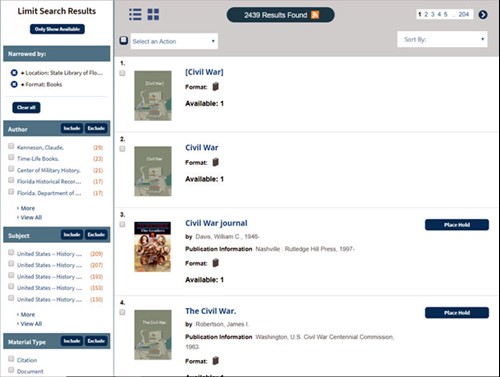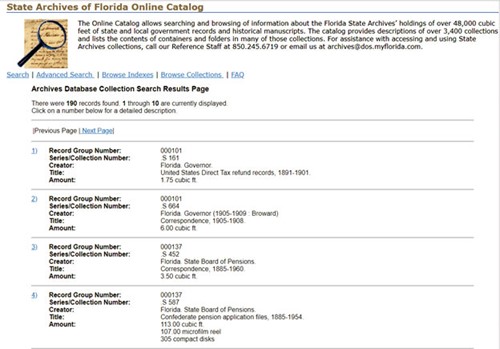About Archives
Have you ever wondered what archives are, what they collect, or why you need them? Find out more about archives below.
If you have additional questions about archives or the State Archives, please contact us at 850.245.6719 or [email protected].
Questions about archives
- 1. What is an archives? And what does an archives collect?
-
The intentional, purposeful management of selected collections of historically valuable, original records with a long-term commitment to their enduring preservation and access makes an archives.
The U.S. National Archives and Records Administration describes an archives as “a place where people can go to gather firsthand facts, data, and evidence from letters, reports, notes, memos, photographs, and other primary sources.”
At the State Archives of Florida, we collect the historically significant records of the state of Florida. Our collections include original records from all branches of Florida government, a limited amount of local governments, and from citizens, private organizations and businesses.
Check out our online catalog and finding aids for more information about our materials. These records are available to anyone interested in using the original, unpublished materials in the Archives’ collections.
If you have any questions about our collections, contact our reference staff at 850.245.6719 or [email protected].
- 2. How does an archives collect materials?
-
An archives may collect the original, unpublished materials from its parent organization, government agencies, private citizens, organizations and businesses and/or universities, depending on the type and mission of the archives.
An archives may actively seek out records, or it may passively collect materials, relying on individuals, businesses, etc. to contact staff with possible archival records. Archives may also rely on records management programs to collect materials.
At the State Archives, we do a little bit of everything. For the state government records, we work with our records management program to identify public records that may have archival value.We also actively seek records from agencies, organizations and individuals that we know have records of historical significance, and we passively collect materials from those that notify us when they have records they believe may have archival value.
If you are interested in donating to the State Archives, please visit our donation page for more information.
- 3. Are archives just like libraries?
-
Though archives and libraries both provide researchers with invaluable resources and their collections often complement each other, libraries and archives are distinctly different institutions.
Generally speaking, libraries collect and make available published materials, such as books, magazines and newspapers, which researchers can use to begin exploring a topic. The collections at libraries are often widely available at other libraries and for purchase at bookstores.
Archives collect original records from agencies, individuals, organizations, churches, businesses, etc. that researchers can examine and interpret to further their research about a topic.
To demonstrate the differences between libraries and archives, check out the examples below of search results for “Civil War” at the State Library of Florida and the State Archives of Florida.

The search results for the State Library show 2,439 results of just books. If you were to search for Civil War Journal by William C. Davis, you would be able to find it at any number of libraries across the country.

The search results for the State Archives show series of records that either have subject terms or descriptions with “Civil War” in them. Governor Broward’s Correspondence (Series S664) is a unique series of records held by the State Archives.
- 4. Why do we need archives?
-
Archival collections are important to society because they ensure accountability and protect civic rights and responsibilities. Archives fulfill our responsibility to our forebears and successors to document public memory and connect us to our past and our descendants to us.
That State Archives collects Florida’s historical records, which are among the most important historical and cultural resources belonging to the people of Florida. These unique, irreplaceable records are essential to ensuring the rights of citizens and organizations and to understanding the responsibilities and limitations of government.
They offer insight into our diverse heritage and history; provide government officials the perspective they need to manage responsibly; and supply valuable information for historians, genealogists, teachers and students from across the state and beyond.
- 5. How are records arranged at an archives?
-
Archivists often talk about five levels of arrangement to help understand the hierarchical nature of archival records. These levels of arrangement are explained below.
Repository
This is the broadest level of archival arrangement, referring to the major organizational structure of a repository’s collections, or its main collecting areas or themes.
Our collections are arranged into our five main collecting areas:
- State government records
- Local government records
- Private manuscript collections
- The Florida Photographic Collection
- Genealogical collection
Record group or collection
This refers to the entire body of records within the archives created by one department, agency, business, family, person or organization. By keeping records of one agency together and not combining records from different agencies, archives are following the basic principle of respect des fonds. For example, at the State Archives, all records of the Florida Supreme Court are under Record Group 1100.
Series
This is a subgroup of a record group or collection, consisting of records that document a particular function or activity of that creator, or that have a common physical format.
Within the Supreme Court record group, the State Archives has S49, Case Files, and Series S1256, Mandatory Review Death Penalty case files, among other series of Supreme Court records.
File unit
This refers to how materials are grouped or filed within a series. For example, files might be arranged numerically by case number, alphabetically by topic, or chronologically by date of meeting.
Item
This refers to how individual documents or items are arranged, such as letters within a folder that are arranged by date, or photographs in an album that are arranged chronologically.
Archives strive to preserve the original order of the materials, which means keeping the files in the order created and maintained by the creating agency. The order of the materials provides context and may show how an agency operated, how they used the records, or what was important to the agency about the records.
- 6. How do you use an archives for your research?
-
Archives are useful to a variety of researchers including, but not limited to, genealogists, historians, students, teachers, lawyers, government officials and employees, documentary filmmakers and authors. Archivists are able to help this array of researchers identify potential records of interest and provide those records to them.
When visiting an archives, it is important that you have some knowledge of the topic that you are researching. If you are looking into your family history, for example, you may already know your parents’, grandparents’ and great-grandparents’ names, birth and/or death dates and locations where they lived.
If you know that your great-grandfather served in World War I, the State Archives reference archivist would direct you to the World War I Service Cards.
If an ancestor owned an automobile in Florida in the early 1900s, we would show you the Early Auto Registrations.
If you were researching the Civil Rights Movement in Tallahassee, the archivist might refer you to the Patricia Stephens Due Papers or to the correspondence of Governor Leroy Collins or Governor Farris Bryant.
The reference archivist helps identify series or collections that relate to your research, leaving you the fun task of looking through original, historic records to find the specific information necessary to further your research.
Since archives have one-of-a-kind collections, you may not find the information you are looking for at one repository. Archivists will direct you to other archives that may have additional materials related to your research.


